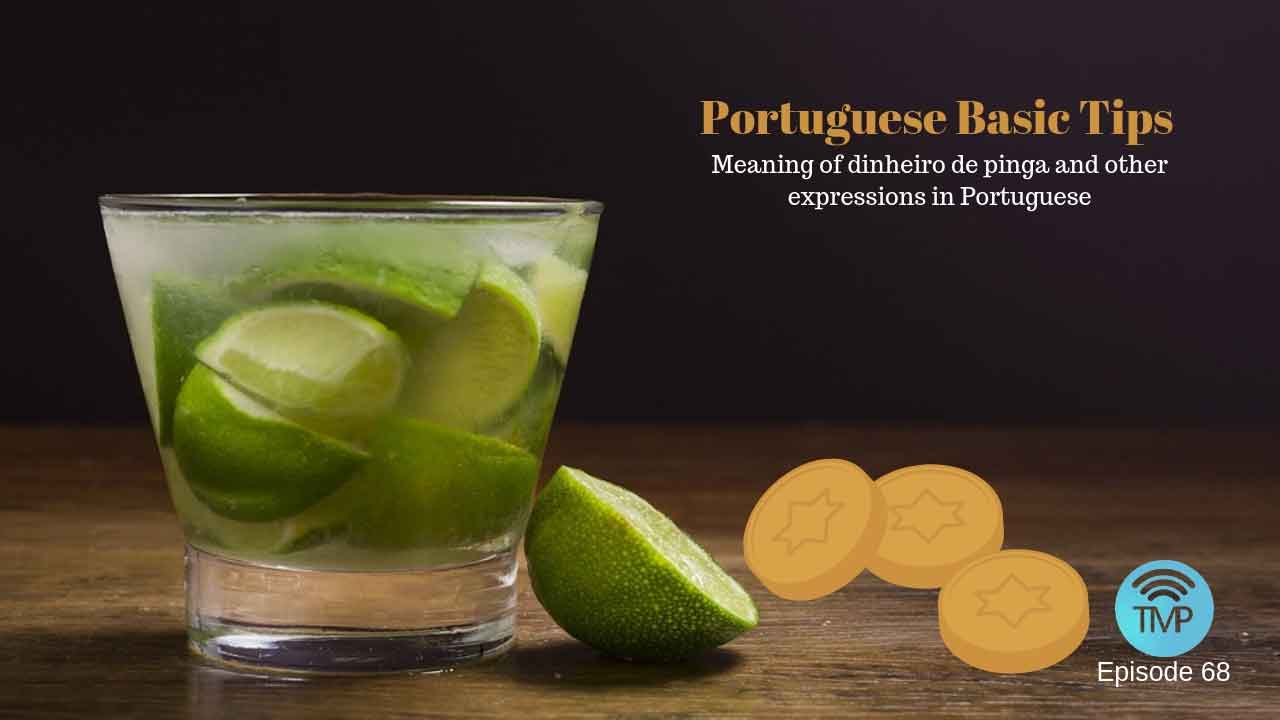Meaning of dinheiro de pinga and other expressions in Portuguese

Meaning of dinheiro de pinga and other expressions in Portuguese
Hello there and welcome to our Portuguese Basic Tips 68 (in English) called meaning of dinheiro de pinga and other expressions in Portuguese
As you know, the process of acquiring vocabulary in one language can be time consuming.
That’s why in our podcasts, we do something that we here in Brazil call “processo a conta-gotas”. Just relax! I’ll explain the term to you.
Click on the link to visit our previous episode called verbal regency in Portuguese part 2
On today’s podcast, we are going to learn the meaning of three new expressions in Portuguese as: a conta-gotas, dinheiro de pinga and poucas e boas. So let’s get started!
A conta-gotas
See, in Portuguese “conta gotas” is the same as “eyedropper” in English. So let’s imagine we have someone sick here. He needs to take a medicine, all right?
Notice that we have to measure exactly how many drops of that drug the patient needs: one by one, step by step. It’d be too risky doing it with no measures to follow.
When I say that we need to learn something “a conta gotas”, I mean we’re going to learn it “step by step”.
There’s no reason for doing it different. It wouldn’t be effective if I filled this podcast out of expressions. You wouldn’t remember all of them.
Let’s listen to a few examples:
- Eu estou aprendendo a conta gotas, mas serei paciente. (I’m learning it slowly, but I’ll be patient).
- É um trabalho que deve ser feito a conta gotas para que dê certo ( This is a job that we need to make step by step, so it’ll work)
We also use the expression “tijolo por tijolo” with the same meaning.
Poucas e boas
Our second expression today is going to be poucas e boas.
In Brazil we often say the sentence: falou pouco, mas falou bonito. This means that we don’t need to speak too much, when we want to say something. We just need to get right to the point.
The expression “poucas e boas” has something to do with this way of thinking. This is used, in most cases, when you’re angry about something that happened.
For instance:
- Eu já estava nervoso com aquilo, então falei poucas e boas para ela. (I was already angry about that, so I gave her a piece of mind).
Dinheiro de pinga
Our last expression today is “dinheiro de pinga”. Literally, we could understand it as “money we use to buy pinga”.
Pinga is an alcoholic beverage produced in Brazil. Buying pinga here is usually very cheap. For instance, you could have “caipirinha made of vodka” or “caipirinha made of pinga”. If you choose the second one, you’ll probably pay less for it.
At this point, you may know that when we say “dinheiro de pinga”, we mean we’re buying something cheap. But, you should also know that this has kind of a pejorative meaning. When we use this expression we are generally using sarcasm included.
For instance:
- Aquela Ferrari foi dinheiro de pinga para ele (Buying that Ferrari meant nothing to him. He could by a lot of them)
- Você quer que eu te pague o que te devo? Tudo bem: isso é dinheiro de pinga para mim! (Do you want me to pay what I owe you? Ok, it means nothing to me!)
Become a Premium Member and download our full transcripts
If you don’t know the real meaning of those terms, click on the link and do your researches
That’s enough for today!
I hope you like it.
Marcos Sales
Podcast: Play in new window | Download







1 Response
[…] Visite nosso episódio anterior chamado “significado dinheiro de pinga e outras expressões em português” […]